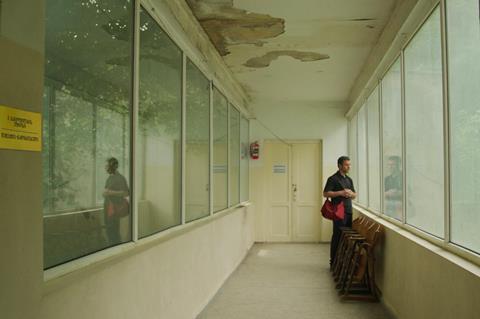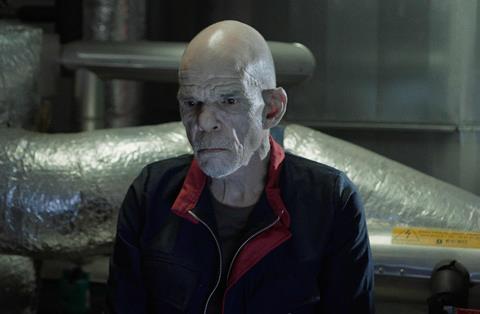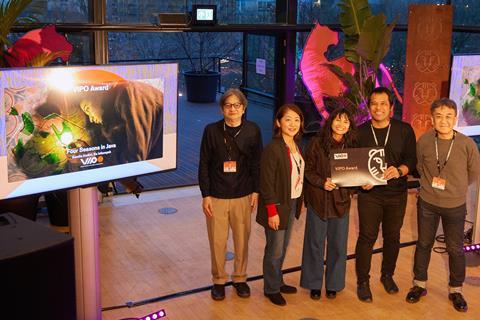
Industry delegates have given a broadly positive response to this year’s International Film Festival Rotterdam co-production market CineMart and its work-in-progress event Darkroom, which wrapped after five days on Wednesday evening (February 6).
Attendees praised the “diversity” of the selection, the first under new head of IFFR Pro, Marten Rabarts, and the careful way in which it was curated.
“I was surprised by the quality of the projects. A lot of the projects had a market stamp,” producer Alexa Rivero of Paris-based Altamar Films commented of the 24 CineMart and 12 Darkroom titles.
“Overall, I believe that this year’s CineMart was a success and the selection was clear-cut and convincing in both selection strands, catering to the needs of sales and festivals alike,” agreed Tajana Kosor, scouting the event for Greek outfit Heretic, a sales agent but also a potential co-producer.
CineMart, now in its 42nd year, remains one of the European industry’s oldest and most cherished co-production events. Festival hits from Payal Kapadia’s All We Imagine as Light to Marcelo Caetano’s Baby, have passed through the most recent editions.
2025 highlights
One CineMart project that clearly stood out this year was Irish director Rioghnach Ni Ghrioghair’s Meat, a cannibal folk horror tale with LGBQ elements set in famine-stricken Ireland. It’s about a young girl taken in by a mysterious group of women whose secret to survival is cannibalising the wealthy men in the nearby estate. This is being produced by Deirdre Levins through Fantastic Films and is currently at financing stage.
At an event full of art house fare, Meat was regarded by many as a film with evident commercial potential. “It’s not usual at CineMart to see a market project like this,” said one French attendee.
Bosnian project How Melissa Blew A Fuse from director Una Gunjak, and produced by Amra Bakšić and Lara Grozdanic through SCCA/pro.ba, likewise attracted multiple meetings requests. This follows a middle aged Bosnian woman who steals money from her workplace in Dortmund and then hits the road in a second hand Audi.
Political slant
Surveying the selection, Rabarts noted the strong political slant of many of the projects in Rotterdam. These were often films struggling to raise financing at home - and the CineMart and Darkroom therefore had added significance.
“The world is on fire and what do we do about it?” Rabarts commented of the way so many projects addressed ongoing global upheaval. “This is something I brought into all my conversations with the selection committee. Of the 500 films [submitted] so many were driven by this question of existential dread about what world we live in.”

Titles in the selection dealt with, variously, “authoritarianism, colonialism, climate change and the abuse of the environment,” said Rabarts.
“Also, what was coming through from the LGBTQ queer community was a sense of dread of what the future might hold,” Rabarts added, citing titles like Cheryl Dunye’s Black Is Blue set in a dystopian future where AI technology is used in a sinister fashion to pair couples.
Chilean director Thomas Woodroffe, who won the Eurimages New Lab Award for Outreach in Darkroom for his project Bloques Erráticos (Erratics], now in post-production, revealed that Argentinean financing promised to the film hadn’t come through “because of the political situation in Argentina,” leaving a sudden gap in the budget. Meeting potential partners in Rotterdam therefore had extra importance for him and his team.

“Funding wise, it [CineMart] will probably mean something very important. Sales agents get in with MGs and sometimes those are useful for finishing the post-production. Of course, the fact that we won will be very useful to close that gap,” Woodroffe commented.
Georgian films in the Darkroom focus were especially well received, with some winning prizes on Wednesday evening among them politically charged love story Tear Gas by Uta Beria, produced by Anna Khazaradze, Nino Chichua, and Guillaume Dreyfus, and Rati Oneli’s revenge thriller, Wild Dogs Don’t Bit. These are movies being put together at a time of extreme political unrest in the country.
Kenyan project Enkop (The Soil) by Angela Wanjiku Wamai also had its fans. The fictional film, about a woman struggling to cope after the suicide of her husband, draws heavily on its director’s family background and on the troubled colonial history of the country. It is being made through Nairobi-based LBx Africa. Bramwel Iro is producer.
Heretic’s Kosor chose among her CineMart highlights Ukrainian director Dmytro Sukholytkyy-Sobchuk’s Something Strange Happened to Me. This is a drama exploring grief and loss in the wake of the Russian-Ukrainian war.
In the works in progress, Kosor was enthusiastic about Romanian director Ivana Mladenović’s Sorella di Clausura, about a woman dangerously obsessed with a Serbian musician from former Yugoslavia. “As fresh and engaging as her earlier work. Irresistibly funny, perceptive, its stylistic approach dominated by immaculate trashiness,” Kosor commented.
Like many in Rotterdam, the Heretic exec was impressed by the Georgian projects, among them Wild Dogs Don’t Bite, which she described as “impossible to stop thinking about.”

Among the more established names in the CineMart selection was Kamila Andini, the Indonesian director of Four Seasons in Java, a drama about a rape survivor confronting her past. Her earlier feature, Before, Now & Then had its world premiere at the 2022 Berlinale and won the Silver Bear Award for supporting actress. The new feature, produced by Ifa Isfansyah and being made through Forka Films, already has Anthony Chen of Singapore’s Giraffe Pictures on board as co-producer and is in advanced development.
Established talent
Several CineMart projects were at a much earlier stage. Nonetheless, one exec attending said that Rotterdam was no longer the place to find new talent.
“If I want to look for new names, I go to smaller markets. That’s where the surprises are. To reach CineMart, usually you’ve already been in certain circles - people know you,” the exec commented.
Some suggested that the works in progress titles were more compelling thatnthose in the CineMart simply because they are at a much later stage and are therefore easier to assess in market terms.
Gone are the days when two or three CineMart projects would complete their financing in the course of their Rotterdam meetings and when all the leading French and German sales agents would make it a point of principle to be in attendance. Nonetheless, the event’s value to the independent market is still apparent.
“This is the fourth time I have been in the market at this festival and it’s just a really friendly environment,” commented Lilian Hess, who won Best Immersive Project in CineMart for her project, Strata. “It is so well organised. We are matched up with really relevant stakeholders to talk to. The best that comes out of is that people know about the project and you get leads into who you might collaborate and coproduce with.”
“CineMart is the original co-production market in the world. Many co-production markets were born out of that model. It still is a great home to many art cinema projects because it is more difficult now than ever to get those projects financed,” says industry consultant Wonsun Shin, formerly director of film festival strategies at Korean powerhouse CJ Entertainment.






![The Brightest SunScreen[Courtesy HKIFF]](https://d1nslcd7m2225b.cloudfront.net/Pictures/274x183/3/5/0/1448350_thebrightestsunscreencourtesyhkiff_312678.jpg)




























No comments yet